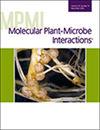求助PDF
{"title":"柑橘黄单胞菌亚种间相互作用的探讨。柑橘-农杆菌-柑橘提高农杆菌介导的植物瞬时表达。","authors":"Tirtha Lamichhane, Hang Su, Xiaoen Huang, Nian Wang","doi":"10.1094/MPMI-12-24-0164-R","DOIUrl":null,"url":null,"abstract":"<p><p><i>Agrobacterium-</i>mediated transient expression (AMTE) is an important tool in plant genetics studies and biotechnology. AMTE remains problematic in citrus and many plant species. Previous research has shown that pretreatment of citrus leaves with <i>Xanthomonas citri</i> subsp. <i>citri</i> (<i>Xcc</i>), which causes citrus canker, significantly improves the AMTE efficacy. Here, we have shown that <i>Xcc</i> promotes AMTE mainly through triggering cell division and upregulating plant cell wall-degrading enzymes. We demonstrate that <i>Xcc</i> improves AMTE via PthA, a transcription activator-like effector known to trigger cell division in citrus, and mutation of <i>pthA4</i> abolished the promoting effect of <i>Xcc.</i> Mutation of the effector (PthA4)-binding element in the promoter region and coding region of <i>CsLOB1</i>, which is known to be directly activated by PthA4, significantly reduced <i>Xcc</i> promotion of AMTE. Mutation of <i>PthA4</i> significantly reduced the expression of cell division-related genes (<i>CDKA</i>, <i>CDKB1-2</i>, and <i>CDKB2-2</i>) compared with wild-type <i>Xcc</i> and the complemented strain. Cell division inhibitor mimosine but not colchicine also significantly decreased <i>Xcc</i> promotion of AMTE. In addition, PthA4 is known to upregulate plant growth hormones auxin (indole-3-acetic acid), gibberellin, and cytokinin, as well as cell wall-degrading enzymes (e.g., cellulase). Exogenous application of indole-3-acetic acid, cytokinin, and cellulase but not gibberellin significantly improved AMTE in leaves of sweet orange, pummelo, Meiwa kumquat, lucky bamboo, and rose mallow. Our study provides a mechanistic understanding of how <i>Xcc</i> promotes AMTE and develops practical measures to improve AMTE via pretreatment with plant hormones (i.e., auxin and cytokinin) and cellulase. [Formula: see text] Copyright © 2025 The Author(s). This is an open access article distributed under the CC BY-NC-ND 4.0 International license.</p>","PeriodicalId":19009,"journal":{"name":"Molecular Plant-microbe Interactions","volume":" ","pages":"479-488"},"PeriodicalIF":3.4000,"publicationDate":"2025-05-01","publicationTypes":"Journal Article","fieldsOfStudy":null,"isOpenAccess":false,"openAccessPdf":"","citationCount":"0","resultStr":"{\"title\":\"Exploration of the Interactions Between <i>Xanthomonas citri</i> subsp. <i>citri-Agrobacterium-</i>Citrus to Improve <i>Agrobacterium-</i>Mediated Transient Expression in Plants.\",\"authors\":\"Tirtha Lamichhane, Hang Su, Xiaoen Huang, Nian Wang\",\"doi\":\"10.1094/MPMI-12-24-0164-R\",\"DOIUrl\":null,\"url\":null,\"abstract\":\"<p><p><i>Agrobacterium-</i>mediated transient expression (AMTE) is an important tool in plant genetics studies and biotechnology. AMTE remains problematic in citrus and many plant species. Previous research has shown that pretreatment of citrus leaves with <i>Xanthomonas citri</i> subsp. <i>citri</i> (<i>Xcc</i>), which causes citrus canker, significantly improves the AMTE efficacy. Here, we have shown that <i>Xcc</i> promotes AMTE mainly through triggering cell division and upregulating plant cell wall-degrading enzymes. We demonstrate that <i>Xcc</i> improves AMTE via PthA, a transcription activator-like effector known to trigger cell division in citrus, and mutation of <i>pthA4</i> abolished the promoting effect of <i>Xcc.</i> Mutation of the effector (PthA4)-binding element in the promoter region and coding region of <i>CsLOB1</i>, which is known to be directly activated by PthA4, significantly reduced <i>Xcc</i> promotion of AMTE. Mutation of <i>PthA4</i> significantly reduced the expression of cell division-related genes (<i>CDKA</i>, <i>CDKB1-2</i>, and <i>CDKB2-2</i>) compared with wild-type <i>Xcc</i> and the complemented strain. Cell division inhibitor mimosine but not colchicine also significantly decreased <i>Xcc</i> promotion of AMTE. In addition, PthA4 is known to upregulate plant growth hormones auxin (indole-3-acetic acid), gibberellin, and cytokinin, as well as cell wall-degrading enzymes (e.g., cellulase). Exogenous application of indole-3-acetic acid, cytokinin, and cellulase but not gibberellin significantly improved AMTE in leaves of sweet orange, pummelo, Meiwa kumquat, lucky bamboo, and rose mallow. Our study provides a mechanistic understanding of how <i>Xcc</i> promotes AMTE and develops practical measures to improve AMTE via pretreatment with plant hormones (i.e., auxin and cytokinin) and cellulase. [Formula: see text] Copyright © 2025 The Author(s). This is an open access article distributed under the CC BY-NC-ND 4.0 International license.</p>\",\"PeriodicalId\":19009,\"journal\":{\"name\":\"Molecular Plant-microbe Interactions\",\"volume\":\" \",\"pages\":\"479-488\"},\"PeriodicalIF\":3.4000,\"publicationDate\":\"2025-05-01\",\"publicationTypes\":\"Journal Article\",\"fieldsOfStudy\":null,\"isOpenAccess\":false,\"openAccessPdf\":\"\",\"citationCount\":\"0\",\"resultStr\":null,\"platform\":\"Semanticscholar\",\"paperid\":null,\"PeriodicalName\":\"Molecular Plant-microbe Interactions\",\"FirstCategoryId\":\"99\",\"ListUrlMain\":\"https://doi.org/10.1094/MPMI-12-24-0164-R\",\"RegionNum\":3,\"RegionCategory\":\"生物学\",\"ArticlePicture\":[],\"TitleCN\":null,\"AbstractTextCN\":null,\"PMCID\":null,\"EPubDate\":\"2025/5/28 0:00:00\",\"PubModel\":\"Epub\",\"JCR\":\"Q2\",\"JCRName\":\"BIOCHEMISTRY & MOLECULAR BIOLOGY\",\"Score\":null,\"Total\":0}","platform":"Semanticscholar","paperid":null,"PeriodicalName":"Molecular Plant-microbe Interactions","FirstCategoryId":"99","ListUrlMain":"https://doi.org/10.1094/MPMI-12-24-0164-R","RegionNum":3,"RegionCategory":"生物学","ArticlePicture":[],"TitleCN":null,"AbstractTextCN":null,"PMCID":null,"EPubDate":"2025/5/28 0:00:00","PubModel":"Epub","JCR":"Q2","JCRName":"BIOCHEMISTRY & MOLECULAR BIOLOGY","Score":null,"Total":0}
引用次数: 0
引用
批量引用

 求助内容:
求助内容: 应助结果提醒方式:
应助结果提醒方式:


